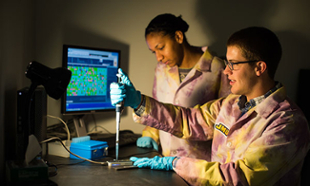New center to boost undergraduate genomics research at JMU
News
A new university genomics research center – the Center for Genome and Metagenome Studies (CGEMS) -- at James Madison University will increase research opportunities for undergraduates and expose them to cutting edge technology.
"Already we have genomics and bioinformatics courses, we have a viral discovery and genomics course, we talk about genomics a lot and we do some genomics research at JMU, but this allows us to get more students hands-on and actually doing research in the classroom and the lab," said Dr. James Herrick, an associate professor of biology who announced the center is a go.
Gene sequencing, or DNA sequencing, is used in a number of fields, from biological research to forensics to health research. Herrick's research focuses on antibiotic resistance genes. Other researchers at JMU carry out genomics and metagenomics research in virology, bacterial pathogenesis, aquatic microbiology, amphibian conservation, copepod evolution and eukaryotic gene expression.
"This allows us to get more students hands-on and actually doing research in the classroom and the lab." — Dr. James Herrick
Advances in gene sequencing make headlines almost daily and JMU already has some of the latest gene sequencing technology. Herrick and a couple of his students have even been testing a "next-next-generation" sequencer — developed by Nanopore Technologies in Oxford, England — that is not yet on the market.
"Until fairly recently, even the next-generation sequencers were really mainly functioning in larger sequencing centers that were devoted to that," Herrick said. "They only in the past few years started to get the technology in smaller individual labs."
One of JMU's latest equipment additions for gene sequencing is the Ion Torrent Personal Genome Machine, one of those next-generation sequencers. "The first generation of DNA sequencers were revolutionary in biology and led to the sequencing of the human genome and the sequencing of the first genomes of many different organisms," Herrick said. "Next generation sequencers allow us to sequence massive amounts of DNA."
And there are more 'omics' than just geneomics for JMU students to study. "There are metagenomics and proteomics and what's called transcriptomics, which is gene expression, and then there's metabolomics and various other '-omics'. And we will be working in some of those fields, especially metagenomics and transcriptomics," Herrick said.
The center also will boost a collaboration Herrick has with a University of Virginia researcher and JMU alum, Dr. Steven Turner. Turner is director of bioinformatics at U.Va. Bioinformatics is the process of analyzing the massive amounts of data produced by the sequencing technology.
# # #

